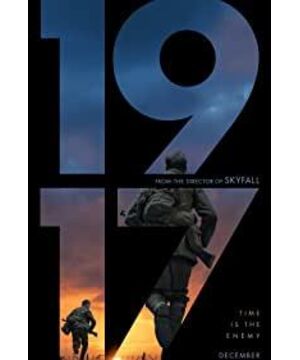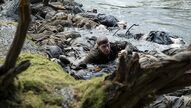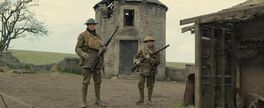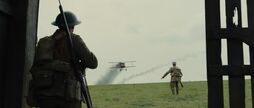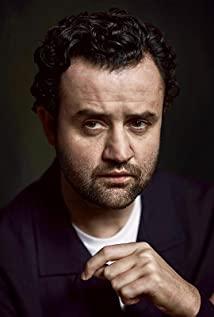The biggest highlight of "1917" is the "telling method". Of course, this is not its narrative method or editing skills, but his "pseudo-one-shot" has created us in war films and the messengers are always with us. Fit.
It was like a pair of eyes in a cloud, or the peeping of a self-spirit, observing the great courage, the suffocating environment, the small but great personal emotions, the unstoppable time...
The story of the movie, in fact, can be told in one sentence. It says nothing more than: a pair of British messengers, only 16 years old, received a mission in 1817, at the height of the First World War, they will risk their lives Danger sends armistice orders to the front lines of the war. In such a journey, they have to pass through abandoned trenches, a battlefield full of holes, see huge rats and corpses everywhere, villages burned to ruins by artillery fire, rushing rivers... Yes, they take such a mission on the road , to stop a war that may sacrifice 1,600 people, but soon after starting, one of them died, leaving only one person to complete the "Lord of the Rings"-like mission.
It is said that director Sam Mendes' grandfather was a messenger during the First World War, responsible for sending messages between different war zones. This film is like a letter the director sent to his grandfather.
The director won the Academy Award for Best Picture when he directed "American Beauty" at the age of 34, and he is also an excellent theater director, with the popular drama "Lehman Brothers Trilogy", the British National Theater version of "Lehman Brothers Trilogy". King Lear was also written by him. It is precisely because of this that his outstanding dramatic talent is presented in all aspects in this film, scheduling, rhythm, sense of reality, dream-making, precision... He almost uses the entire battlefield as a stage, and he is astonishing with ease and ease It shows what he calls "the micro in the macro". This movie, which seems to use one long shot, is actually composed of several long shots. Its photography skills and arrangements always make me wonder when I watch the movie: "How did he do it?"
Because it is by no means the kind of literary style film that takes long shots for the sake of long shots (such as Bi Gan's dazzling skills), the shots of this film are just right, subtle and composed, and unusually restrained.
For example, there is a shot, that is, shortly after one of the soldiers died, when another soldier met a squad, we first jumped into their car with the soldiers and saw him sitting in the middle of them, behind the truck, At this time, the car drove away, and the camera shot out from the corner. We saw other soldiers talking nonsense, while the little soldier was in deep silence even though he was among his companions. His expression was obviously that he had not had time to accept it, or that the aftershocks had not yet dissipated. In that huge and sudden deepness, he looked like a human-shaped blank dug out of many dark shadows. In fact, there is no close-up of him in the camera at this time, and his expression is not dramatic, but we can't help but be heartbroken.
There is a brutal poetic quality to many of the film's scenes, but I'll give just one example below. That's what I saw in Yasujiro Ozu's book. Yasujiro Ozu wrote the example of apricot flowers in the battlefield. It feels like it was completely captured by "1917".
Yasujiro Ozu wrote in the original text: "I was on the front line of the battlefield during the Xiushui River crossing after the Lugou Bridge Incident. There was an apricot tree with beautiful white flowers near the trench. The Chinese army launched an attack, mortar shells flew in and machine guns clacked. There was a rattling sound, and there was a booming cannon in the middle. In the sound and the wind, the white flowers drifted down very beautifully. I looked at the flowers and thought, there is such a way of describing the war! This is also a music and picture. example."
In "1917", we saw a scene like this: the little soldier fell into the waterfall with his death in his hand, soaked and exhausted. When he was barely floating on the water with a broken tree in his arms, he had just escaped the pursuers. As soon as he took a breath, he seemed to be falling into the deepest despair. Suddenly, white petals floated from the sky and fell on the water around him... This is a touch of friendship between Sam Mendes and Yasujiro Ozu. It completely presents the contrast and contrast between human life and falling flowers on the river of death, but also very different from falling flowers.
Overall, the film isn't about digging deep into human nature, but it creates a kind of symbolism (or mythological rhetoric) with extreme force and striking realism, where the soldier is like every A person who has to run with a mission or life, or we poor human beings, must overcome difficulties and obstacles, the line of fire, the hail of bullets, the river of death, and finally reach the other side that seems to be the destination.
Just as I was writing these words, I suddenly thought that I was in the 2020 Spring Festival when the epidemic was dangerous.
View more about 1917 reviews


